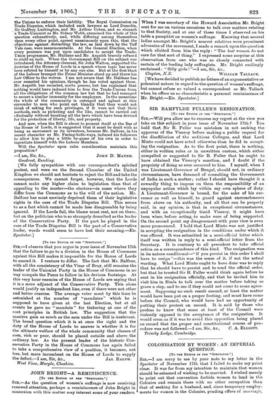SIR BAMFYLDE FITLLER'S RESIGNATION.
[To THE EDITOR OF THE " SPECTATOR."] yon allow me to express my regret at the view you take on this, subject in your issue of November 17th P You hold that Sir B. Fuller was mistaken in not seeking the approval of the Viceroy before making a public request for the disaffiliation of the seditious Colleges, and that Lord Mints could not have acted otherwise than he did in accept- ing the resignation. As to the first point, there is nothing, either in written rules or in unwritten custom, which either compelled or suggested to Sir B. Fuller that he ought to have obtained the Viceroy's sanction, and I doubt if the propriety of doing so ever occurred to him. I myself, when I was Lieutenant-Governor of Bengal, should not, in ordinary circumstances, have dreamed of consulting the Government of India in such a matter; rather I should have thought it a cowardly thing to impose on them the responsibility of an unpopular action which lay within my own sphere of duty. A Lieutenant-Governor is bound, for the sake of his suc- cessor as well as himself, to guard against encroachments from above on his authority, and all that can be properly said, in my opinion, is that in exceptional circumstances, and with an exceptionally timid Viceroy, it might have been wiser, before acting, to make sure of being supported. On the second point my disagreement with your view is even more pronounced. I bold that Lord Mints was not justified in accepting the resignation in the conditions under which it was offered. It was submitted in a semi-official letter which itself was written in reply to a semi-official letter from the Secretary. It is contrary to all precedent to take official action on a correspondence of this kind. The resignation was in its nature conditional—" if you persist in this order I shall have to resign "—this was the sense of it, if not the actual wording. What Lord Mints ought to have done was to reply that he should have to persist and to send the official order, but that he trusted Sir B. Fuller would think again before Ile sent in his resignation officially, and that he invited him to visit him in Simla to talk over the matter before taking so grave a step, and to see if they could not come to some agree- ment. Supposing no such result ensued;- at least the matter would have been put on a proper footing, and must have come
before the Council, who would have had an opportunity of putting their protest on record. It is said by those who profess to know that some at least of the Council were violently opposed to the acceptance of the resignation. It would seem as if it was to avoid this opposition being placed on record that the proper and constitutional course of pro - cedure was not followed.—I am, Sir, 8/c., C. A. ELLIOTT. Trinity Lodge, Cambridge.














































 Previous page
Previous page